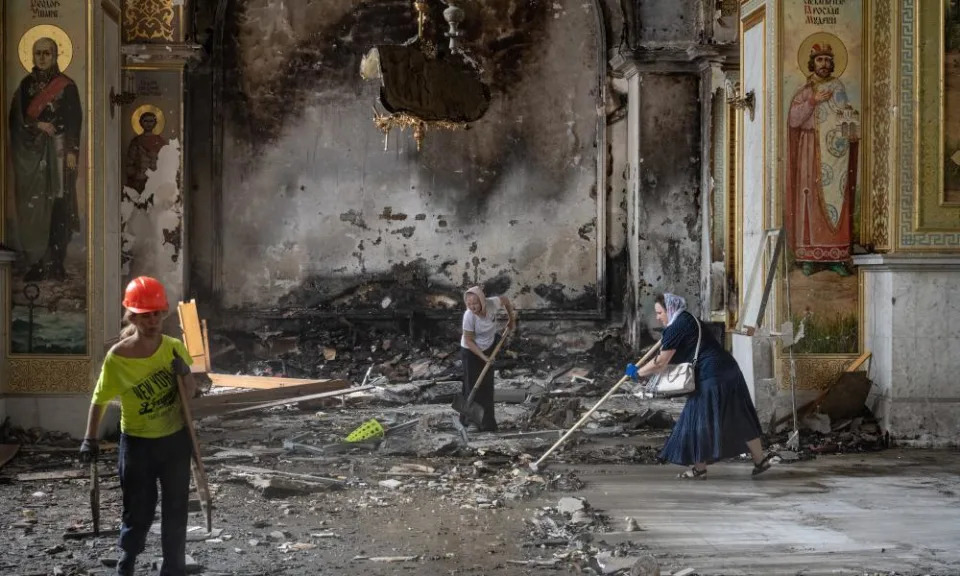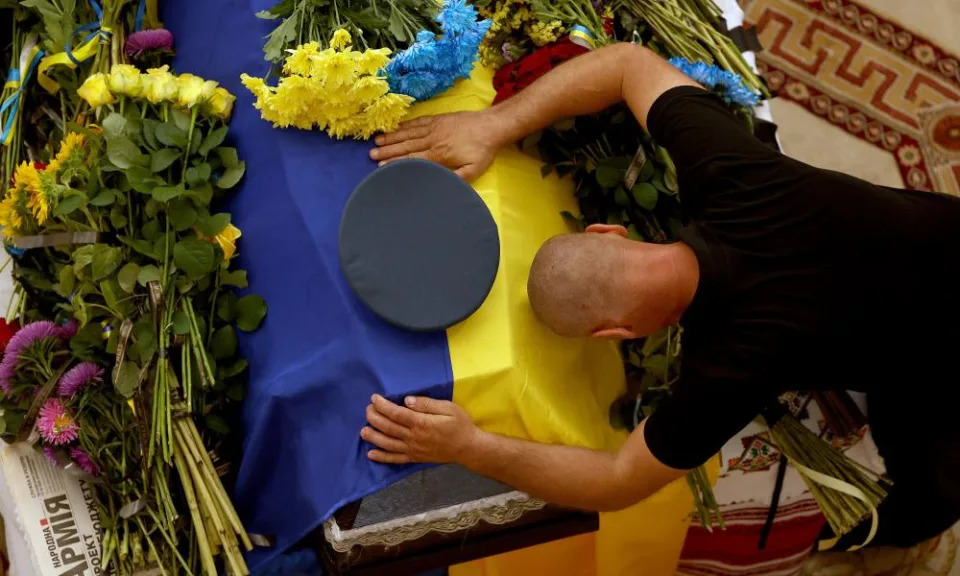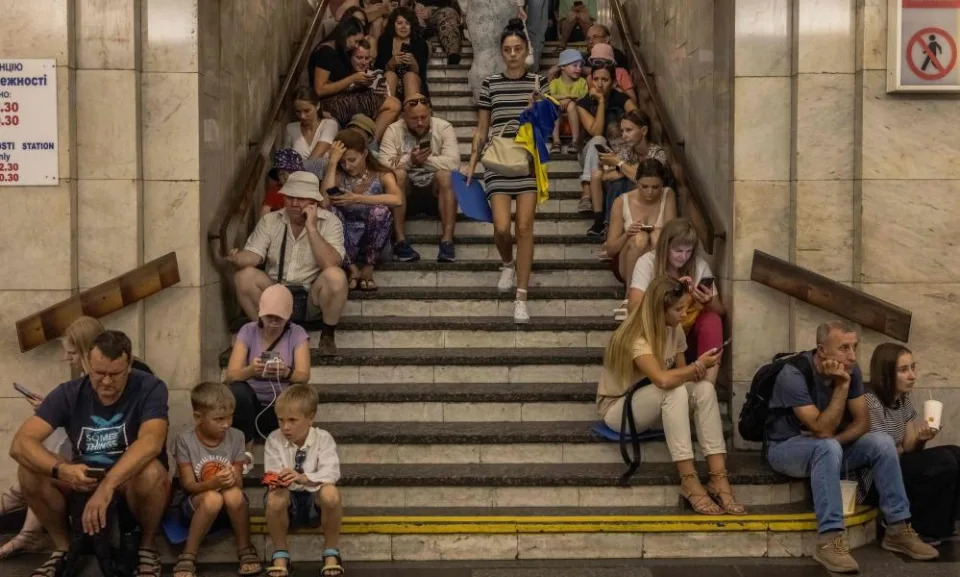Russia is taking my friends one by one – and now I struggle even to write about them
Oleksandr Mykhed
Fri, 22 September 2023

Photograph: Scott Peterson/Getty Images
Day 563 of Russia’s full-scale invasion of Ukraine. Ninth year of the war. Kyiv is saying goodbye to Ihor Kozlovsky, philosopher, religious scholar and lecturer. A Teacher. A man whose reputation was crystal clear.
In the winter of 2016, 62-year-old Kozlovsky was seized in his apartment in Donetsk by terrorists of the so-called Donetsk People’s Republic. He was accused of being pro-Ukrainian and of having educated many students who took a pro-Ukrainian patriotic stance when Russia began its aggression against Ukraine. Kozlovsky found himself in Russian captivity, which did not comply with any norms of international humanitarian law: humiliation, beatings, limbs broken while handcuffed, electric shocks, strangulation, hangings.
Kozlovsky was held captive for 700 days, almost two years.
After his release, he radiated warmth and started calling himself “an eternal debtor to love”, which gladdened the students and friends who had supported him. Kozlovsky said that he felt responsible for this “portal of love”.
On 6 September 2023 he died in his sleep. He was 69. Another incredible person who Russia took from us, bringing grief and pain, an ordeal that no heart can withstand. Nor any body. Losses with which you learn to live afresh every time.
The last breath of the second summer of the invasion. And just like during the previous one, hardly anyone paid any attention. Like any season of the year now, it is just a sticky mixture of days, losses, fury and glimmers of hope.
Ukrainians are learning to bypass Meta algorithms in order to carry on talking about the horror of the invasion; volunteers are finding new ways to raise funds for vehicles, drones and tactical medical materials for the front. Singing a cover of a Backstreet Boys hit, playing a concert, auctioning off a spent missile case or a rare book from a private library. Anything. The important thing is that it helps to save lives and bring victory closer.
On 25 August, the day after Independence Day, Capt Andriy Pilshchykov, Maj Vyacheslav Minka and Maj Serhiy Prokazin, the future of Ukrainian aviation, died in a horrific plane crash. Pilshchykov, 30, (whose call sign was “Juice”) was one of the key voices to advocate on a global stage for the provision of F-16 aircraft to Ukraine, needed to hasten the victory. All three were a part of the collective Ghost of Kyiv, as the 40th tactical aviation brigade, which defended Kyiv at the beginning of the invasion, is called.

A soldier at the funeral of Ukrainian fighter pilot Andriy Pilshchykov in Kyiv, Ukraine, 29 August 2023. Photograph: Cathal McNaughton/EPA
It has been a summer of alarming calls. After news about yet another Russian shelling of civilian infrastructure in any given Ukrainian city, the calls begin. The scale and number of attacks and the choice of targets are such that we often know the victims. The theatre in Chernihiv, the market in Kostyantynivka, the residential district of Sumy. Russia is aiming for global famine and destroying port infrastructure in the south of our country. Destroying the crops. Destroying the ships. Destroying the cathedral in the very centre of Odesa. Blow after blow, shock after shock batters our consciousness. Tragedies that take your breath away – and each subsequent one instantly relegates the previous horror further back into the annals of time. It is like every week you are being plunged into yet unknown depths of the ageing process.
My friend: a 45-year-old professor, an ichthyologist, who lost everything after the occupation of his home town and joined the armed forces in the first days of the invasion. Call sign “Lucky”. Deployed near Bakhmut. A tank shell fragment got lodged in his armpit. Doctors made five holes in his body to get it out. But it is not known how much of it is still there.
Another friend: a 26-year-old pizza chef, the kindest and most life-loving sort. Call sign “Muffin”. Deployed near Bakhmut. For the first time in his life, he is trying to rescue a seriously wounded person. There are three of them. They have to leave behind those who cannot be saved. He calls me. I am looking at the broken pixels of video communication. We are crying together.
A mutual friend of ours: a 28-year-old artist, the son of an Orthodox priest, the fifth child of six. Call sign “Trunk”. He joined the air assault troops. A month of hard battles. Badly wounded. Now in rehabilitation. He wants to return to his brothers and sisters-in-arms as a chaplain. Wants to be closer to the frontline. To support his own.
An astonishingly handsome man with a heart-melting smile: a 23-year-old manager of educational programmes and a band. Call sign “Dwight”. Without telling his parents and friends, he is mobilised into a famous assault brigade. I ask him about his motivation. He says: “Survive the war with dignity and move on. Burnish myself. Learn from the warriors who, more than anyone, are familiar with how this war works.” He says his motivation is “revenge for the dead. Love for those who are close.”
The armed forces of Ukraine are retaking territories that have been under Russian occupation since 2014. If anyone still thinks that Ukraine is regaining the occupied territories too slowly, they should remember that for every de-mined and liberated metre of our free country, the highest price has been paid by our soldiers.
The pantheon of our national myth is being formed before our eyes. Our friends, teachers, brothers are already in it. And the only thing I dream of is that the living will take their places in the pantheon after victory.

People sheltering in the metro during an air strike alarm in Kyiv, Ukraine, 24 August 2023.
Photograph: Roman Pilipey/AFP/Getty Images
This summer I deleted the missile alarm app from my phone. All the same, the phones of those nearby will alert me. Or the city’s warning sirens. At some point my brain passed this anxiety checkpoint. It is now just a component of this new mutilated reality.
On the day we learned about the death of Ihor Kozlovsky, I met Olena Stiazhkina, a historian, academic and writer from Donetsk. She had known Kozlovsky for decades and had been a close friend of the writer Victoria Amelina, who was killed at the beginning of this terrible summer.
We embraced warmly, literally feeling the fragility of life.
I said that I can no longer write requiems for my fallen friends. I understand how important it is to preserve their memory. But it is becoming difficult for me to put pain into letters.
Olena asked whether we can write about the dead without mentioning ourselves and our feelings.
I said we can’t. Because Russia is taking away my friends and loved ones from me personally. Tearing out my heart piece by piece.
Kozlovsky said that he had witnessed many cases of suicide and madness among prisoners in Russian captivity. What did Kozlovsky do while there? On particularly difficult days, the teacher would give lectures to the rats, so that he could at least hear his own voice. To preserve that which cannot be lost.
Translated by Maryna Gibson
Oleksandr Mykhed is a writer and member of PEN Ukraine
This summer I deleted the missile alarm app from my phone. All the same, the phones of those nearby will alert me. Or the city’s warning sirens. At some point my brain passed this anxiety checkpoint. It is now just a component of this new mutilated reality.
On the day we learned about the death of Ihor Kozlovsky, I met Olena Stiazhkina, a historian, academic and writer from Donetsk. She had known Kozlovsky for decades and had been a close friend of the writer Victoria Amelina, who was killed at the beginning of this terrible summer.
We embraced warmly, literally feeling the fragility of life.
I said that I can no longer write requiems for my fallen friends. I understand how important it is to preserve their memory. But it is becoming difficult for me to put pain into letters.
Olena asked whether we can write about the dead without mentioning ourselves and our feelings.
I said we can’t. Because Russia is taking away my friends and loved ones from me personally. Tearing out my heart piece by piece.
Kozlovsky said that he had witnessed many cases of suicide and madness among prisoners in Russian captivity. What did Kozlovsky do while there? On particularly difficult days, the teacher would give lectures to the rats, so that he could at least hear his own voice. To preserve that which cannot be lost.
Translated by Maryna Gibson
Oleksandr Mykhed is a writer and member of PEN Ukraine
No comments:
Post a Comment